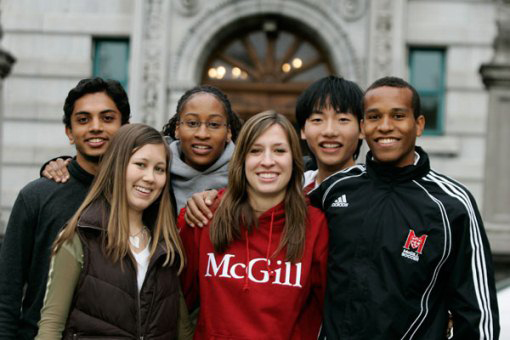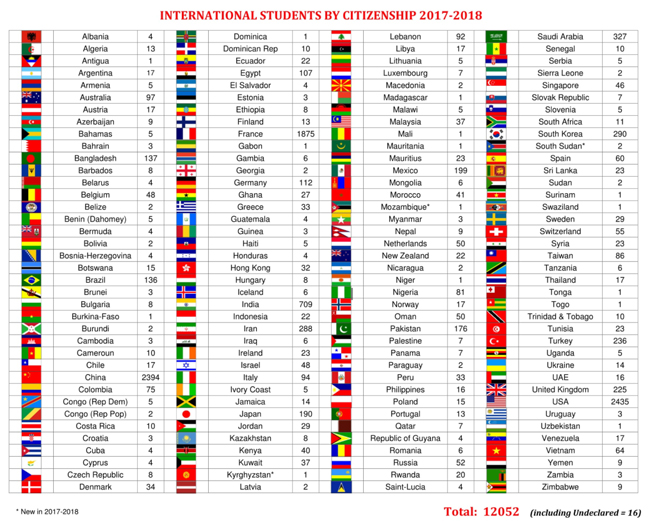
By Caroline Guay
“I vividly recall standing outside Burnside one late November day, awestruck seeing snowfall for the first time in my life” marvels Mukit Bin Momin, a U3 Engineering student from Bangladesh. He’s not the only one for whom snow was a novelty, judging by the staggering diversity of students coming from all corners of the globe. How many new students like Mukit have bravely left their families, friends, and the comfortable familiarity of their home country to travel to Montreal, fuelled by a sense of adventure and the dream of pursuing their studies at McGill?
Ten years ago – in fall 2007 – there were 6,259 international students from 148 different countries enrolled at McGill, accounting for 19 per cent of the student population. Ten years later, the number has almost doubled, with more than 12,000 international students from 152 countries (see graphic below), representing almost a third of the entire student body (30 per cent). A short walk around campus is like taking a tour of the United Nations.
Why is McGill so popular with international students, and what accounts for this year’s record-breaking numbers? Reasons and theories abound. Lindsay Wilmot, a Senior Manager of Recruitment and Communications in Enrolment Services, reminds us that McGill has had a stellar international reputation for decades, as well as a network of alumni that fans out across the globe (becoming great ambassadors for the university). This year may simply be the result of a continuous upward progression that started years ago.
Nevertheless, many are wondering to whether the combined “Trump” and “Brexit” effects have had an impact on the number of international students applying to Canadian universities. While it’s hard to provide a definitive answer, Wilmot suggests that “maybe it had a slight impact on increasing application numbers, but it didn’t make a difference in actual registration numbers.” Indeed, the number of U.S. students at McGill only increased by 2.3 per cent from last year, and the number of students from the U.K. has actually decreased by 11.8 per cent.
Noteworthy, however, is that enrolment from Mexico increased by 34.5 per cent, enrolment from China increased by 24 per cent, and enrolment from India increased by 23.5per cent. This is perhaps because – in contrast to the growing wave of protectionism in the U.S. and the U.K. – Canada has largely been perceived as very safe, peaceful, and open place; a country welcoming to newcomers, and a true champion of the benefits of multiculturalism. Universities across Canada have reported significant growth in their international student populations, no doubt in part thanks to Canada’s positive international image.
The City of Montreal is also having its day in the sun, having been rated the Number 1 student city in the world in 2017 by Quacquarelli Symonds (QS). Wilmot states: “there is definitely a sense that Canada is shining as this international destination, and definitely for us, at McGill, Montreal is huge. We’re really seeing that [QS] rankings placing Montreal as the Number 1 student destination in the world has more than ever put Montreal on the map in students’ minds. So there is definitely a buzz…,“ she adds, “there’s a buzz about Canada and there’s a buzz about Montreal.”
For Katharine Callahan, A U3 Mechanical Engineering student from the U.S., Montreal was a big selling point. “I came to visit Montreal and I just really loved the vibe of the city. I grew up in New York City, so it reminded me of New York.”
Jialu Li, a U2 student in Environmental Science from China who went to high school in Nova Scotia, found that coming to the province of Quebec was about “experiencing a different culture in Canada” and being exposed to another language. That, and the fact that “McGill is one of the best schools in Canada, right, and also the Environmental Science here is really good.” When asked if she had picked up a bit of French since arriving, she responded: “I did a little, yes! It’s very hard.”
Pauline L’Ecuyer, Director of International Student Services at McGill, confirms that culture and language play an important part. “There’s a strong interest for students who want to learn French, to make the best of their stay in Montreal or maybe to plan a long-term project of staying here after graduation and maybe becoming a permanent resident.”
Indeed, opportunities for international students to learn French and participate in Montreal’s rich cultural scene have multiplied in recent years. Not only do McGill students have access to a range of French courses at McGill (credit and non-credit, formal and casual); they also have access to free online French courses from the Quebec government; free admission at Montreal landmarks and cultural events through the Montreal International Student Passport program (run by La Vitrine Culturelle); and easy access to numerous local career networking events through Montréal International.
When it comes to the diversity of McGill’s student body, Wilmot reminds us that it is vital to remember that it’s not just about recruiting international students. “We want [to attract] students from Quebec, and Canada, and internationally. We value a diverse student body, and in order to accomplish that we have to be out there encouraging the best students from everywhere to consider McGill.”
Asked why he chose McGill, Edem Koshi Nuviadenu, a new (U0) Engineering student from Ghana, explained: “These main questions defined my decision: Where can I get a world class education, and in an environment that brings the world closer in terms of the diversity of culture? My answer: McGill University.”


Your article gives the impression that the only international students on campus are undergraduates and that is a terrible misrepresentation. In fact, the proportion of international students at the graduate level (i.e. Master’s and PhD …) is higher than at the undergraduate level – in fact, almost 45% of doctoral students are international.
To provide a more balanced and accurate presentation of the facts you should also have spoken with Graduate and Postdoctoral Studies; I am sure they would have been happy to provide you with the relevant statistics and commentary.
Regards,